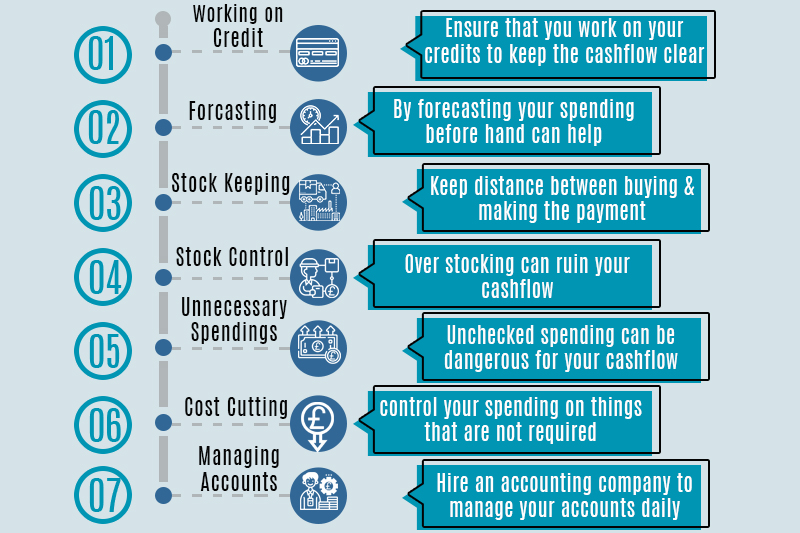7 Important Steps to Consider for Cash Flow Management

November 13, 2020
Managing cash flow is integral to the smooth running of any business. To purchase supplies on time and keep the list of creditors at a low, have a steady flow of cash is required. Having sufficient money coming in as compared to your expenditure would, after all, ensure that you always have sufficient cash on hand. Just running a business is not enough, you will find yourself also investing in it and this means that you would need to have sufficient cash to put in. With the current state of the economy with businesses facing a cash crunch it indeed would be wise to take a thorough look at your cash flow and work on its management. If you find managing your cash flow to be a time-consuming task, you can always ask an accountant to look into it for you.
1. Working on your credits
It is just not what you spend that would affect the way your finances lie. A factor that you need to focus on too is the monies that are owed to you. Having clear payment terms and procedures is sure to be a great help here. This should be done on paper and also aired during your verbal interactions. Keeping a track of what is due thus, unfailingly becomes your responsibility. Due to this, you need to ensure that there is a deadline at least imposed for late payments as this would affect your cash flow drastically if payments keep piling up and you have no one to oversee this.
2. Get those forecasts right
Where you intend to spend cash and which months would see a greater flow too should be foreplanned or at the very least, forethought. By forecasting your spending, you can have a prediction of where you would be spending but a word of caution here – you need to be as real as possible when you think of these forecasts as without being realistic the forecast wouldn’t be of much use to you. To see how effective your forecasting skills are, see how close what you have forecasted for your business spends tallies with reality. Thus, you might have to actually brainstorm for a few hours and even go through your previous expenses. No wonder business owners prefer hiring accountants to look into this!
3. Taking stock of your suppliers
Purchases are inevitable and so it makes sense to keep as much distance as possible between when you buy and the time you have to make the payment. Customers neither buy nor make a payment in a hurry and so you paying caution to the winds is very important. Unpaid amounts are always a worry until you do finally make the payment and so, having proper terms chalked out in advance should help to ease the burden.
4. Exercising stock controls
Overstocking too is a factor you need to put some thought upon. When you’ve taken in more stock than you can sell you have effectively frozen the cash that you could otherwise have had at hand. Considering this, you should first do a proper inventory before you get down to buying something or stocking up as the right balance here is crucial. Yes, having stock at hand when the demand is there is imperative but you need to ensure that you have the right quantity and that too at the right price as the prices too vary depending on when the stock was purchased.
5. Don’t spend on what you don’t need
When it comes to investing in your business it is difficult to control the urge to spend. There are umpteen things you might want to improve or improvise on but unchecked spending, be it on equipment or any other type of expense needs a measure of caution to be exercised. Even if the business is running smoothly it does not imply that you should simply go on a buying spree. This will help manage your cash flow better. Alternatively, you can have your accountants track your spending trends and give you feedback on the same.
6. Get rid of those extra costs
Efficient saving is all about buying what you need and doing away with the extraneous expenditure. You need to focus on what is required to run your business as improvements are a continuous process – it is never-ending. If you control your spending on things that are not required then you will find that there is more cash that you have at hand.
7. Preparation counts
Have an accountant do your management accounts for you or sit with the books yourself and see the way the wind is blowing. Get to know the various trends in your business. Reports are just bunches of paper unless you make sense of them. If you are constricted on time then get someone else to do this for you.
Doshi Outsourcing can assist you in preparing your cash flow.



